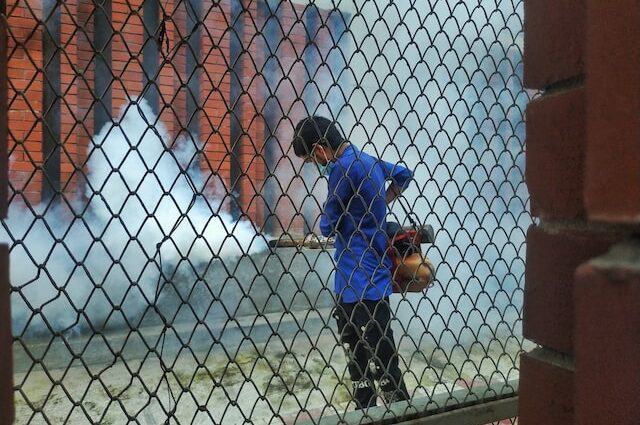Is Mosquito Fumigation Effective in Preventing Dengue?
Mosquitoes have become a nuisance in our lives spreading diseases like malaria or dengue, putting our life at potential risk. In an environment with stagnant water and a lack of general maintenance, mosquito control becomes a growing need in our neighborhoods. It is not easy to control the mosquito population due to its small size. Hence, chemical control is advisable as an effective method to control and target the possible breeding spots for their eggs. Mosquito fumigation is a process of using gaseous fumigants that poisons the mosquitoes and helps control the spread of disease in an area.
There are no medicines available that help treat dengue specifically. The only way to avoid infection is by preventing mosquito bites. For the prevention of dengue, there are various individual ways or collective ways to avoid mosquitoes. Wearing long-sleeved shirts and long pants, using mosquito repellent on exposed areas of skin, and making sure to have screens or nets on windows and doors to keep mosquitoes outside.
Make sure to empty and scrub, cover or throw out items that hold water such as buckets, pools, flower pots, etc because mosquitoes lay eggs near water.
While these methods are effective to protect yourself and your home, there are some measures to be taken to control the mosquitoes in the area and kill their eggs to avoid further spread. For this, mosquito fumigation services are available to help prevent dengue.
Mosquito fumigation is an effective method of dengue control. It works by misting the air with the chemical solution in places with inundated mosquitoes. It may not be enough one time in some places and require multiple fumigations to reduce the number of mosquitoes.
The process helps reduce 90% of the mosquitoes based on studies. Choosing the right time to fumigate the area can help increase the efficiency of mosquito control. Since mosquitoes come at night to feed, this is the ideal time to use mosquito fumigation. This can significantly affect the mosquito population in the area.
Mosquito fumigation will provide excellent protection for around 72 hours. In this duration, it is at the peak of its control while gradually decreasing with time.
However, in some instances, the area is still mosquito-free until after 2 weeks. The duration of effectivity is dependent on the chemical solution used as a fumigant. The main benefit of using mosquito fumigation is its efficiency and effectiveness. It is the best way to reduce the mosquito population indoors and outdoors to prevent the dengue virus.
The chemical mist contains the insecticide that instantly removes mosquitoes and leaves a protective barrier in the treatment area.
DENGUE BACKGROUND
Dengue is the fastest spreading vector-borne disease in the world, endemic in 100 countries·
- Dengue virus has four serotypes (DENV1, DENV2, DENV3 and DENV4)
- The first infection with one of the four serotypes is usually non-severe or asymptomatic, while the second infection with one of the other may cause severe dengue.
- Dengue has no treatment, but the disease can be managed early.
- The five-year average cases of dengue are 185,008; the five-year average deaths are 732, and the five-year average Case Fatality Rate is 0.39 (2012-2016 data).
TRANSMISSION
Dengue virus is transmitted by day-biting Aedes aegypti and Aedes albopictus mosquitoes.
DENGUE CASE CLASSIFICATION AND LEVEL OF SEVERITY
- Dengue illness is categorized according to the severity level as dengue without warning signs, dengue with warning signs and severe dengue.
- Dengue without warning warnings can be further classified according to signs and symptoms and laboratory tests as suspect dengue, probable dengue, and confirmed dengue.
-
Dengue without warning signs
a.1 suspect dengue
Previously healthy individual with acute febrile illness of 1-7 days duration plus two of the following: headache, body malaise, retro-orbital pain, myalgia, arthralgia, anorexia, nausea, vomiting, diarrhea, flushed skin, rash (petechial, Hermann’s sign)
a.2 probable dengue
Suspect dengue case plus laboratory test: Dengue NS1 antigen test and at least CBC (leukopenia with or without thrombocytopenia) or dengue IgM antibody test (optional)
a.3 confirmed dengue
A suspect or probable dengue case with the positive result of viral culture and Polymerase Chain Reaction (PCR) and Nucleic Acid Amplification Test- Loop-Mediated Amplification Assay (NAAT-LAMP) and Plaque Reduction Neutralization Test (PRNT)
What is the difference between Fumigation and Pest control?
Fumigation is a method of pest control, but pest control does not have to involve fumigation. Fumigation includes using the chemical solution as fumes for pest control which requires a government license.
While pest control refers to as management of species defined as pests and not total elimination of the pests but rather controlling of pests.
CONCLUSION
The mosquito lays more than a hundred eggs at a time. To control their population, eradicating these pests is necessary to prevent virus-like dengue. The fumigation process helps target these, large populations effectively and instantly, resulting in the reduction of mosquitoes and consequently decreasing the spread of diseases enduring a safe and healthy environment as a community.

